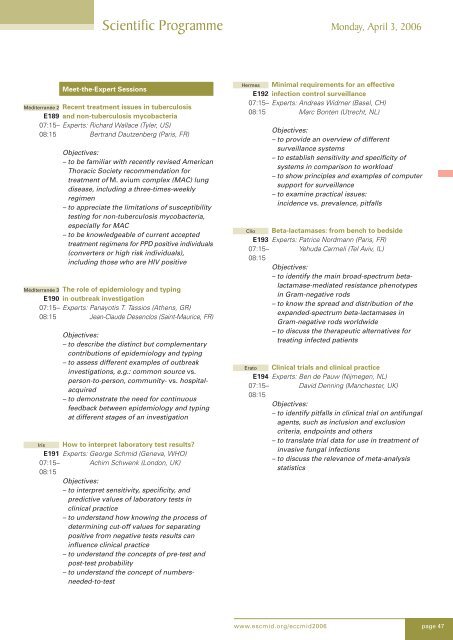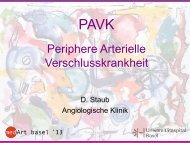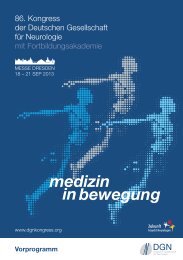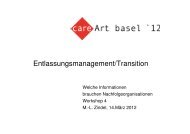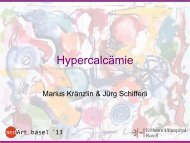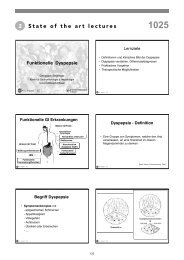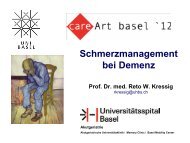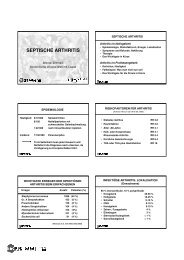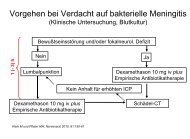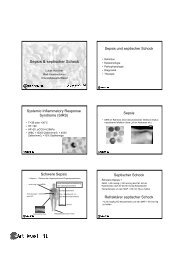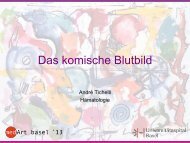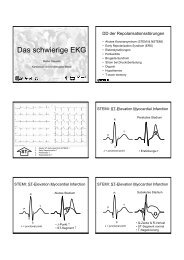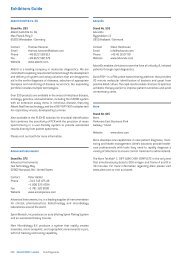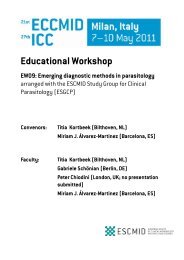Final Programme
Final Programme
Final Programme
Create successful ePaper yourself
Turn your PDF publications into a flip-book with our unique Google optimized e-Paper software.
Scientific <strong>Programme</strong> Monday, April 3, 2006<br />
Meet-the-Expert Sessions<br />
Méditerranée 2 Recent treatment issues in tuberculosis<br />
E189 and non-tuberculosis mycobacteria<br />
07:15– Experts: Richard Wallace (Tyler, US)<br />
08:15– Bertrand Dautzenberg (Paris, FR)<br />
Objectives:<br />
– to be familiar with recently revised American<br />
Thoracic Society recommendation for<br />
treatment of M. avium complex (MAC) lung<br />
disease, including a three-times-weekly<br />
regimen<br />
– to appreciate the limitations of susceptibility<br />
testing for non-tuberculosis mycobacteria,<br />
especially for MAC<br />
– to be knowledgeable of current accepted<br />
treatment regimens for PPD positive individuals<br />
(converters or high risk individuals),<br />
including those who are HIV positive<br />
Méditerranée 3 The role of epidemiology and typing<br />
E190 in outbreak investigation<br />
07:15– Experts: Panayotis T. Tassios (Athens, GR)<br />
08:15– Jean-Claude Desenclos (Saint-Maurice, FR)<br />
Objectives:<br />
– to describe the distinct but complementary<br />
contributions of epidemiology and typing<br />
– to assess different examples of outbreak<br />
investigations, e.g.: common source vs.<br />
person-to-person, community- vs. hospitalacquired<br />
– to demonstrate the need for continuous<br />
feedback between epidemiology and typing<br />
at different stages of an investigation<br />
Iris How to interpret laboratory test results?<br />
E191 Experts: George Schmid (Geneva, WHO)<br />
07:15– Achim Schwenk (London, UK)<br />
08:15–<br />
Objectives:<br />
– to interpret sensitivity, specificity, and<br />
predictive values of laboratory tests in<br />
clinical practice<br />
– to understand how knowing the process of<br />
determining cut-off values for separating<br />
positive from negative tests results can<br />
influence clinical practice<br />
– to understand the concepts of pre-test and<br />
post-test probability<br />
– to understand the concept of numbersneeded-to-test<br />
Hermes Minimal requirements for an effective<br />
E192 infection control surveillance<br />
07:15– Experts: Andreas Widmer (Basel, CH)<br />
08:15– Marc Bonten (Utrecht, NL)<br />
Objectives:<br />
– to provide an overview of different<br />
surveillance systems<br />
– to establish sensitivity and specificity of<br />
systems in comparison to workload<br />
– to show principles and examples of computer<br />
support for surveillance<br />
– to examine practical issues:<br />
incidence vs. prevalence, pitfalls<br />
Clio Beta-lactamases: from bench to bedside<br />
E193 Experts: Patrice Nordmann (Paris, FR)<br />
07:15– Yehuda Carmeli (Tel Aviv, IL)<br />
08:15–<br />
Objectives:<br />
– to identify the main broad-spectrum betalactamase-mediated<br />
resistance phenotypes<br />
in Gram-negative rods<br />
– to know the spread and distribution of the<br />
expanded-spectrum beta-lactamases in<br />
Gram-negative rods worldwide<br />
– to discuss the therapeutic alternatives for<br />
treating infected patients<br />
Erato Clinical trials and clinical practice<br />
E194 Experts: Ben de Pauw (Nijmegen, NL)<br />
07:15– David Denning (Manchester, UK)<br />
08:15–<br />
Objectives:<br />
– to identify pitfalls in clinical trial on antifungal<br />
agents, such as inclusion and exclusion<br />
criteria, endpoints and others<br />
– to translate trial data for use in treatment of<br />
invasive fungal infections<br />
– to discuss the relevance of meta-analysis<br />
statistics<br />
www.escmid.org/eccmid2006 page 47


